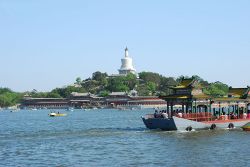Difference between revisions of "CIIC:Today's featured article/September 7, 2018"
From Wiki China org cn
imported>Ciic (Created page with 'thumb|220px|left|Bailu, one of 24 Chinese solar terms. '''Bailu''' ('''白露''') is one of 24 traditional Chinese solar terms, reflecting the changing of fo...') |
imported>Ciic |
||
| Line 1: | Line 1: | ||
| − | [[file: | + | [[file:Beihai Park2.JPEG|thumb|250px|left|The Beihai Park in Beijing]] |
| − | ''' | + | The '''Beihai Park''' ('''北海公园'''), locate in downtown [[Beijing]], is one of the oldest, largest and best-preserved ancient imperial gardens in China. With the Forbidden City and Jingshan Park to its east, Zhong Nan Hai (Central and South Seas) to its south, This ancient garden, with over 1,000 years' history, is not only a classic combination of the grandiosity of the northern gardens and the refinement of the southern gardens in China, but also a perfect integration of magnificent imperial palaces and solemn religious constructions. ([[Beihai Park|More...]]) |
Revision as of 00:41, 6 September 2018
The Beihai Park (北海公园), locate in downtown Beijing, is one of the oldest, largest and best-preserved ancient imperial gardens in China. With the Forbidden City and Jingshan Park to its east, Zhong Nan Hai (Central and South Seas) to its south, This ancient garden, with over 1,000 years' history, is not only a classic combination of the grandiosity of the northern gardens and the refinement of the southern gardens in China, but also a perfect integration of magnificent imperial palaces and solemn religious constructions. (More...)
